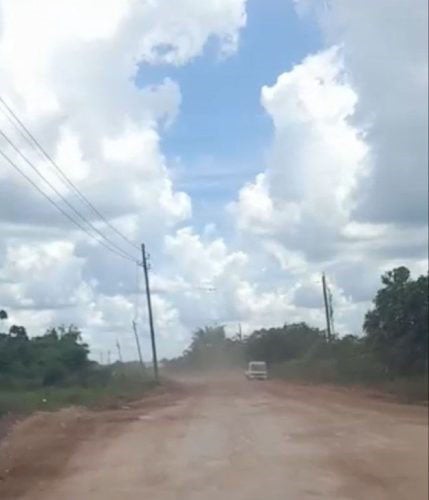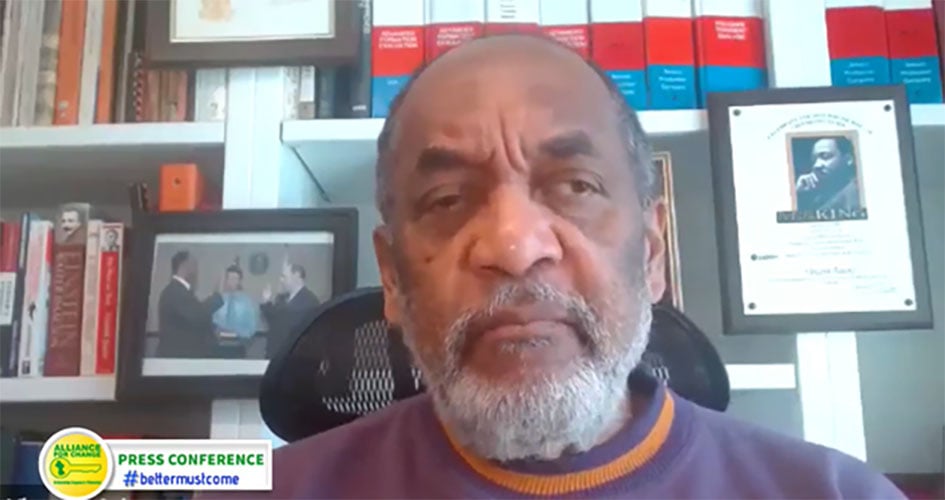– publication of EPA tests on Noitgedacht road
Dr Vincent Adams of the Alliance for Change (AFC) has called on Minister of Foreign Affairs Hugh Todd to apologize for his remarks about the squatting culture in Linden. He also urged Minister of Public Works Juan Edghill to share the results of the testing conducted on the Noitgedacht road.
Speaking at the AFC’s weekly press conference yesterday, Adams said, “As a Lindener and I do not speak for all the Lindeners, but I am sure that I am speaking for most of Lindeners when I say that Minister Todd’s statement that somehow Lindeners have a culture of squatting is very insulting and I think he owes Lindeners an apology”.

An October 13 report in the Stabroek News had quoted Todd as saying, “most of the people in Linden squat” and suggesting that residents should not be offended by the term. “For the residents to come to you and say they have people squatting is not what they should do… Squatting is not unusual,” he had stated. He elaborated that many areas in Linden remain unregulated, with families having occupied lands for decades. “Most people start off in Linden by squatting, you understand, so a lot of the areas have not been regularized,” he had stated. “It’s only on the banks of the river on the Wismar side [that there] are regularized communities. Once you go inland and you start going into the hills, they are all squatting, they are not regularized communities and in some cases even on the Mackenzie side. So squatting is not unusual in Linden… and we are now working to regularize areas [so] people can actually go to the banks and have a mortgage on their properties and all of that. There are some families who have been squatting in Linden for decades, it’s just the history of Linden.”
Todd’s comments seemed to dismiss the concerns of residents regarding land ownership and community development. “When they squat and there is a community being developed nearby, then they call the government for utilities, which is difficult because they need to have proper planning,” he had said, implying that the issues surrounding squatting were systemic rather than individual.
“I don’t want the Lindeners to sensationalize it and take this as a political issue because it’s not,” Todd had added. Adams emphasized the need for sensitivity in discussing the livelihoods and dignity of the community.
Addressing the issue regarding the Nooitgedacht road, Adams, a former head of the Environmental Protection Agency (EPA) challenged Edghill to disclose the findings of the EPA’s studies. He urged the publication of sampling results and the methodologies used to reach their conclusions. “Mr Edghill went up there and said the EPA did their own studies and came up with a different conclusion. We call on Mr Edghill to show us or publish, whatever sampling and analysis they have done and give us the results and how they arrived at this conclusion,” Adams said. “Let him show us the evidence. I see the minister also said the people will spray the road to keep the dust down. Spraying the road is the worst thing because the water would seep through the road and that enhances the seepage of all those toxic chemicals further into the ground, seep into the groundwater, get into the drains and into the streams, and it makes the situation worse.”
Linden Town Councillor Wainwright Bethune, who serves as the Technical Service and Environmental Coordinator for Bosai Minerals Group Guyana Inc, had noticed that materials from the aluminium plant were being used on the road in 2022 and again a few months ago when it deteriorated further.
Bethune proactively collected samples from the road for analysis, leveraging his expertise in quality control. He expressed concern about the concentration levels of potentially toxic elements, emphasising the need for thorough testing to understand their impact. “Even low quantities of certain elements should raise red flags,” he remarked, advocating for the area to be capped to minimise health risks, particularly given the increased traffic and dry conditions.





